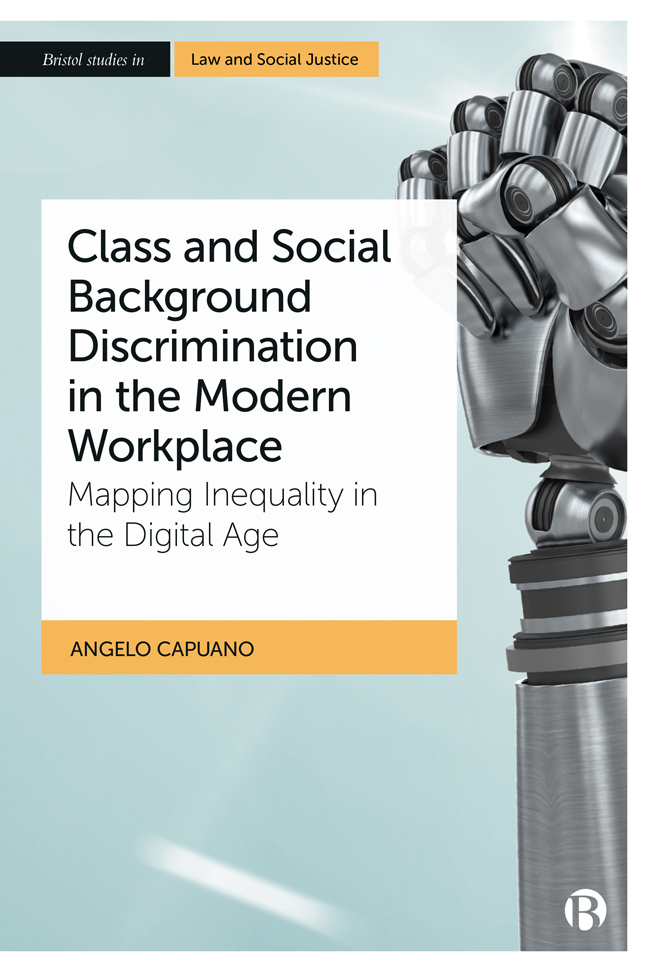 Class and Social Background Discrimination in the Modern Workplace
Class and Social Background Discrimination in the Modern Workplace Book contents
- Frontmatter
- Dedication
- Contents
- Detailed Contents
- Series Editor Preface
- About the Author
- Acknowledgements
- 1 Class and Social Background Discrimination: An Introduction
- 2 Unravelling the Meaning of ‘Social Origin’ Discrimination in Conventions of the International Labour Organization (ILO) and its Applications in the Digital Age
- 3 Mapping the Legal Landscape in Australia, South Africa, Canada and New Zealand and its Applications in the Digital Age
- 4 Social Media in Recruitment, Hiring and Firing Decisions
- 5 Automated Candidate Screening, Algorithms and Artificial Intelligence in Recruitment
- 6 Platform Work and the Post-Pandemic Shift to Remote Work
- 7 Making Future Workplaces Fairer and More Equitable
- References
- Index
6 - Platform Work and the Post-Pandemic Shift to Remote Work
Published online by Cambridge University Press: 23 January 2024
- Frontmatter
- Dedication
- Contents
- Detailed Contents
- Series Editor Preface
- About the Author
- Acknowledgements
- 1 Class and Social Background Discrimination: An Introduction
- 2 Unravelling the Meaning of ‘Social Origin’ Discrimination in Conventions of the International Labour Organization (ILO) and its Applications in the Digital Age
- 3 Mapping the Legal Landscape in Australia, South Africa, Canada and New Zealand and its Applications in the Digital Age
- 4 Social Media in Recruitment, Hiring and Firing Decisions
- 5 Automated Candidate Screening, Algorithms and Artificial Intelligence in Recruitment
- 6 Platform Work and the Post-Pandemic Shift to Remote Work
- 7 Making Future Workplaces Fairer and More Equitable
- References
- Index
Summary
Introduction
Advances in technology and the outbreak of the COVID-19 virus in 2020 have significantly changed the way people work. The internet and applications (‘apps’) on smart devices (such as phones and tablets) now allow people to freelance directly with clients in what has been described as the ‘gig economy’. People now have access to food delivery apps such as Menulog and Deliveroo as well as ride-hailing apps such as Uber, and these are now used as part of the normal lives of many people. COVID-19 has also substantially disrupted the way many people work. In an effort to contain the outbreak of the virus, a number of governments imposed lockdowns which resulted with employees making a mass migration from working in offices to working from home. Even after lockdowns were lifted, this trend towards homeworking and remote working appears to remain popular and many employees now engage in hybrid working (which involves splitting the working week between the office and the home or another remote location).
The rise of the gig economy and the post-pandemic shift to remote working, whilst giving convenience to many, also, for reasons that will be explained in this chapter, disadvantages certain workers and makes other groups of workers vulnerable to exploitation. This chapter will focus on examining both of these developments, to expose how they create risks of discrimination based on class and/or factors reflective of social background.
Part I will examine platform work in the gig economy, to highlight how digital technology is used to fuel the exploitation and underpayment of certain socially and economically vulnerable migrant workers. This part of the chapter will then apply the recent decision of the Quebec Court of Appeal in Bécancour to illuminate how the Quebec Charter's prohibition on ‘social condition’ discrimination may have particular applications in underpayment and wage theft cases. It will also compare this with the legal framework in Australia to show that whilst the decision in Foot & Thai Massage highlights the potential of the FW Act's prohibition on adverse action based on ‘social origin’ to have similar applications, the law in Australia needs reform before it may be able to achieve this.
Part II will examine the post-pandemic shift to remote working and homeworking, to show how it has potential to disadvantage workers at the convergence of class, social background, and other attributes.
- Type
- Chapter
- Information
- Class and Social Background Discrimination in the Modern WorkplaceMapping Inequality in the Digital Age, pp. 177 - 191Publisher: Bristol University PressPrint publication year: 2023
